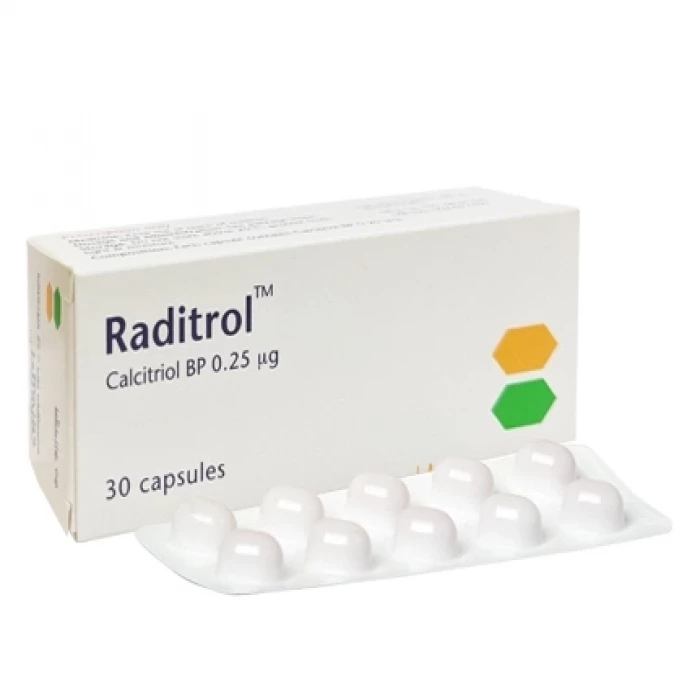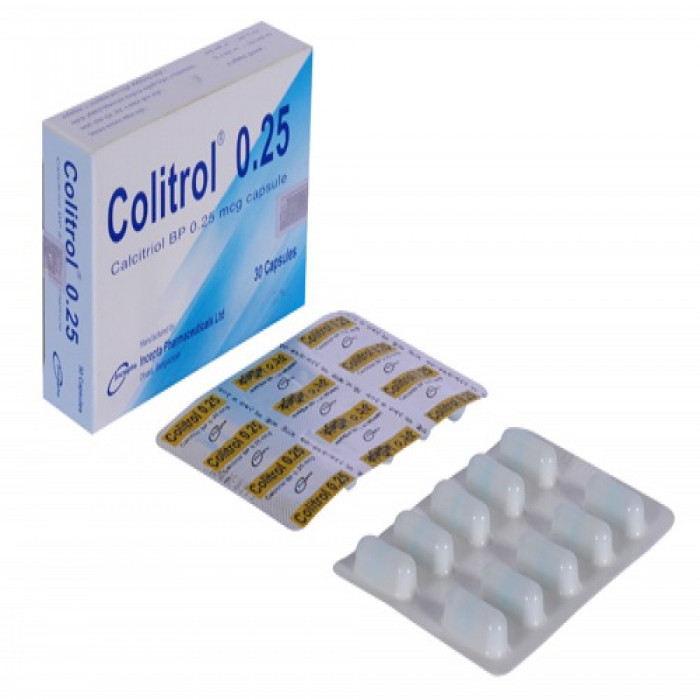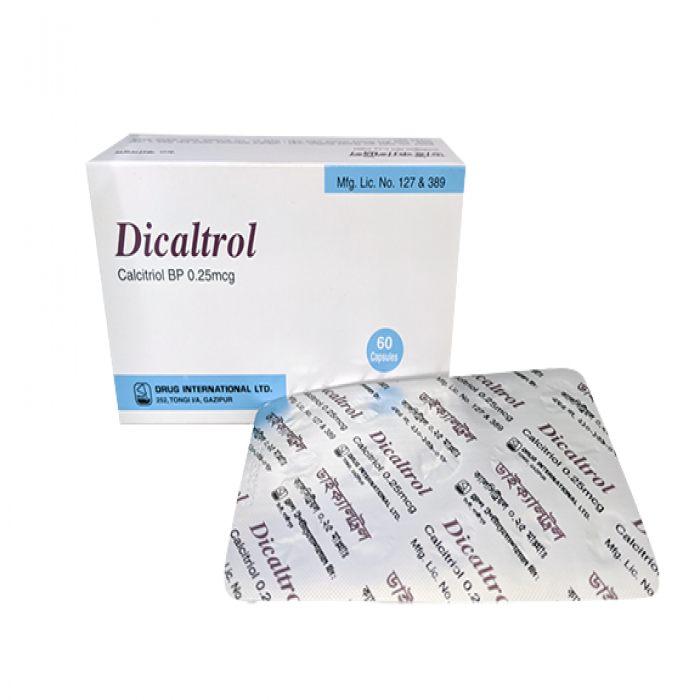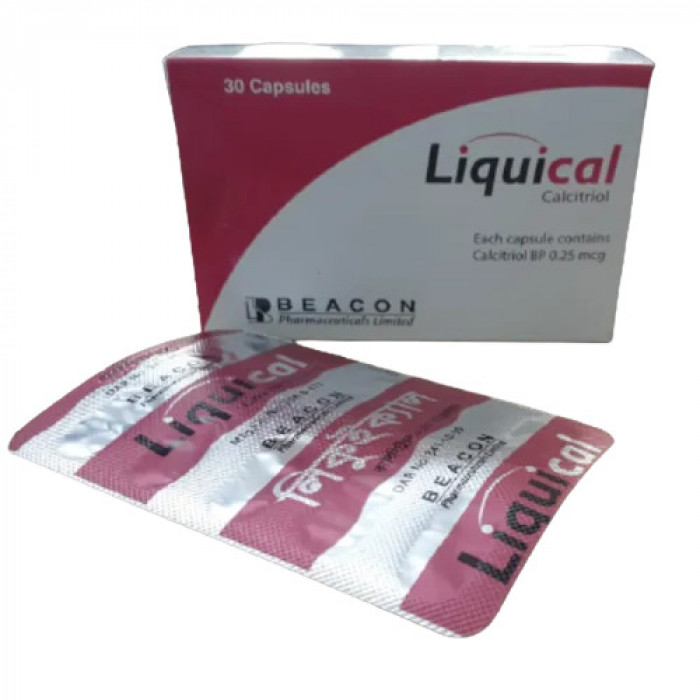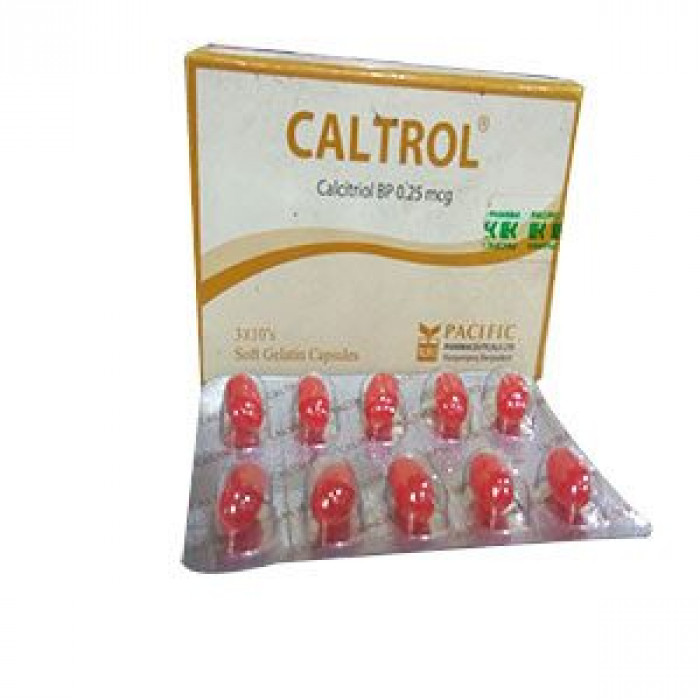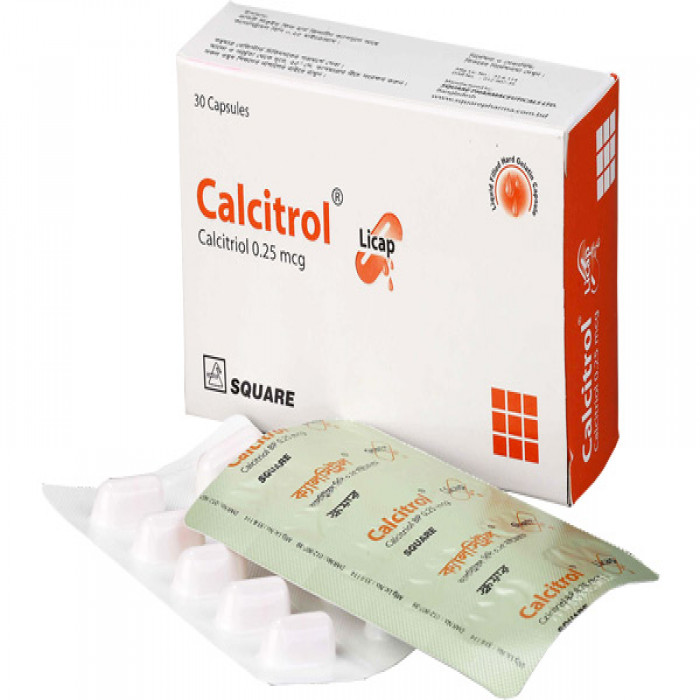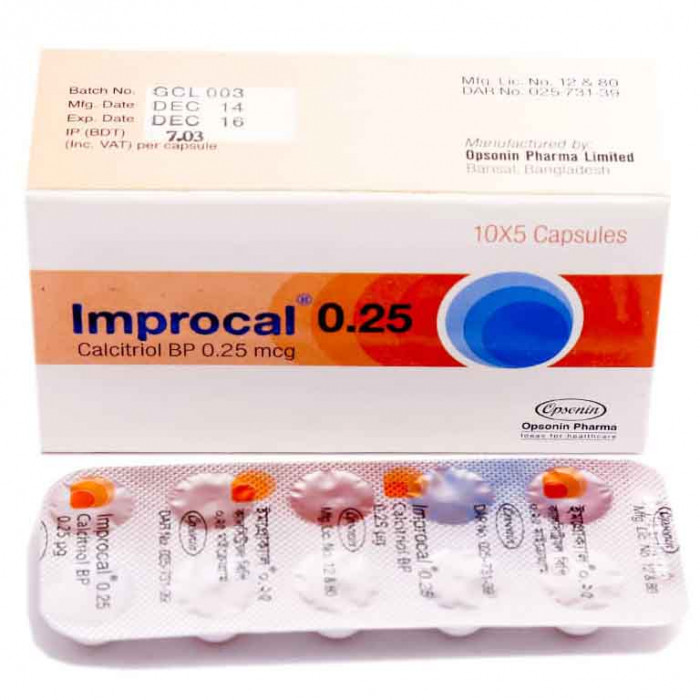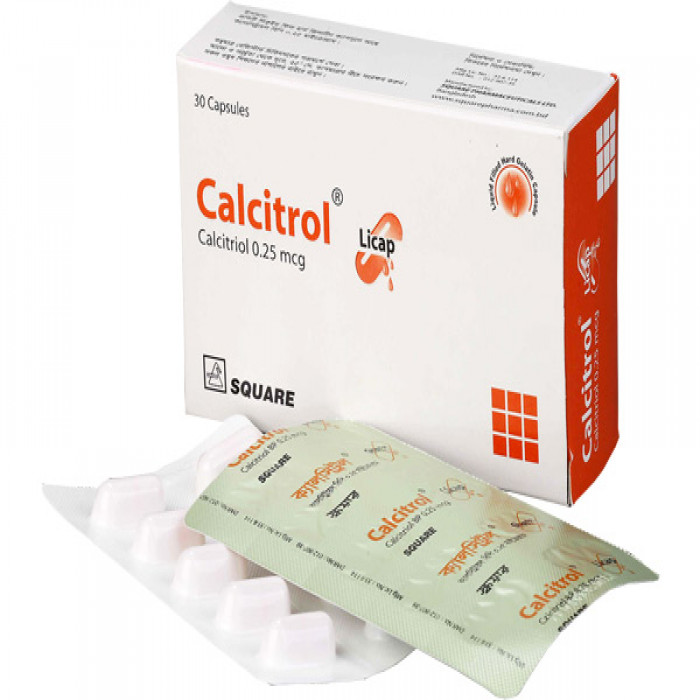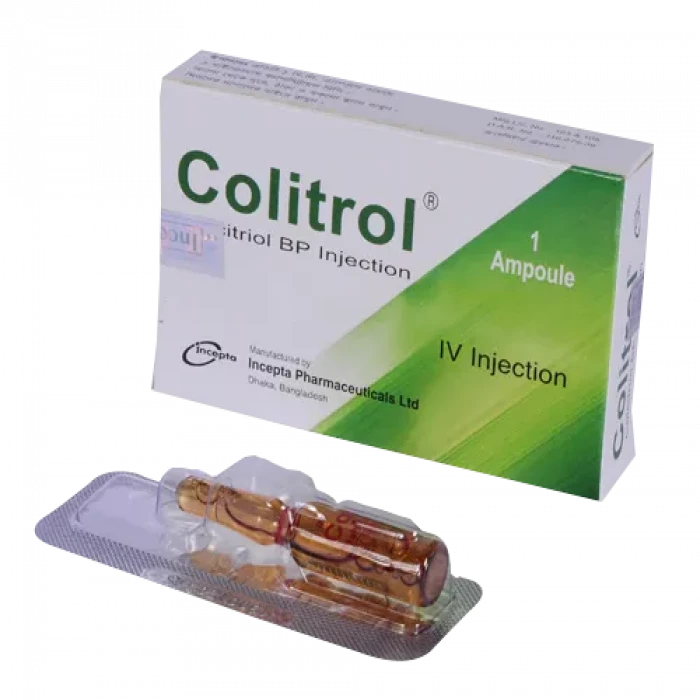
✔ 100% Authentic Product
👁️ Currently Viewing 1890
Colitrol IV Injection
Calcitriol, the active metabolite of Vitamin D3, plays a critical role in:
- Promoting intestinal calcium absorption.
- Regulating bone mineralization.
- Maintaining calcium homeostasis, including stimulating osteoblastic activity in the skeleton.
Calcitriol is naturally synthesized in the kidneys from 25-hydroxycholecalciferol and is essential for bone health and calcium-phosphorus balance.
Discount
Price: ৳ 147
MRP:
৳
155
5%
Off

100% Genuine Products, Guaranteed

Safe & Secure Payments, Always

Fast, Secure & Efficient Delivery

Proper Packaging
 Cash on Delivery - All over Bangladesh
Cash on Delivery - All over Bangladesh Regular Delivery - 12-24 Hours, Dhaka City* Charge Tk.39-59
Regular Delivery - 12-24 Hours, Dhaka City* Charge Tk.39-59 Regular Delivery - 24-48 Hours, Other Cities* Charge Tk.99-110
Regular Delivery - 24-48 Hours, Other Cities* Charge Tk.99-110
 ফ্রি ডেলিভারিঃ - ৯৯৯ টাকা+ অর্ডারে, ঢাকা
শহরে
ফ্রি ডেলিভারিঃ - ৯৯৯ টাকা+ অর্ডারে, ঢাকা
শহরে ফ্রি ডেলিভারিঃ - ২৯৯৯ টাকা+ অর্ডারে, ঢাকার
বাহিরে
ফ্রি ডেলিভারিঃ - ২৯৯৯ টাকা+ অর্ডারে, ঢাকার
বাহিরে
100% Genuine Products, Guaranteed
Safe & Secure Payments, Always
Fast, Secure & Efficient Delivery
Proper Packaging
 Cash on Delivery - All over Bangladesh
Cash on Delivery - All over Bangladesh Regular Delivery - 12-24 Hours, Dhaka City* Charge Tk.39-59
Regular Delivery - 12-24 Hours, Dhaka City* Charge Tk.39-59 Regular Delivery - 24-48 Hours, Other Cities* Charge Tk.99-110
Regular Delivery - 24-48 Hours, Other Cities* Charge Tk.99-110 ফ্রি ডেলিভারিঃ - ৯৯৯ টাকা+ অর্ডারে, ঢাকা
শহরে
ফ্রি ডেলিভারিঃ - ৯৯৯ টাকা+ অর্ডারে, ঢাকা
শহরে ফ্রি ডেলিভারিঃ - ২৯৯৯ টাকা+ অর্ডারে, ঢাকার
বাহিরে
ফ্রি ডেলিভারিঃ - ২৯৯৯ টাকা+ অর্ডারে, ঢাকার
বাহিরে
✅ Description:
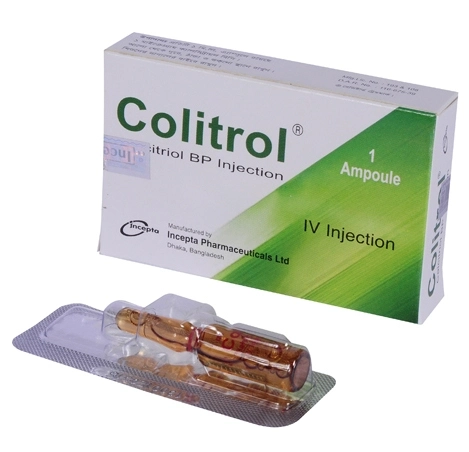
✔️ Colitrol is indicated for the management of:
- Post-menopausal osteoporosis
- Renal osteodystrophy
- Postsurgical hypoparathyroidism
- Idiopathic hypoparathyroidism
- Pseudohypoparathyroidism
- Secondary hyperparathyroidism in moderate to severe chronic renal failure (pre-dialysis)
- Vitamin D-dependent rickets
✔️ Dosage & Administration
Dosing recommendations are based on serum calcium levels and the condition being treated.
Post-menopausal Osteoporosis:
- Oral dose: 0.25 mcg twice daily.
Renal Osteodystrophy (dialysis patients):
- Initial dose: 0.25 mcg daily.
- For normal or slightly reduced calcium levels: 0.25 mcg every other day may suffice.
Hypoparathyroidism and Rickets:
- Initial dose: 0.25 mcg/day (in the morning).
- If no response in 2–4 weeks, increase the dose at 2–4-week intervals.
Secondary Hyperparathyroidism (Pre-dialysis):
- Adults and children aged ≥3 years: 0.25 mcg/day, increased to 0.5 mcg/day if needed.
- Children aged <3 years: 10–15 ng/kg/day.
Intravenous administration:
- Initial dose: 1 mcg (0.02 mcg/kg) to 2 mcg three times weekly (every other day).
- Doses can range from 0.5 mcg to 4 mcg based on severity and response.
- Dose adjustments should occur at 2–4-week intervals.
- Children:
- Pre-dialysis secondary hyperparathyroidism: Initial dose is 10–15 ng/kg/day for children <3 years.
- Elderly:
- No specific dose adjustments are required.
✔️ Side Effects
Early side effects:
- Weakness, headache, somnolence, nausea, vomiting, dry mouth, constipation, muscle pain, metallic taste.
Late side effects:
- Polyuria, polydipsia, anorexia, weight loss, conjunctivitis (calcific), pancreatitis, photophobia, pruritus, nocturia, rhinorrhea, cardiac arrhythmias, and rarely psychosis.
Injection-related side effects:
- Occasional mild pain at the injection site.
✔️ Interaction
Thiazide diuretics:
- Risk: Increases hypercalcemia risk.
- Recommendation: Monitor calcium levels closely.
Digitalis treatment:
- Risk: Hypercalcemia may precipitate cardiac arrhythmias.
- Recommendation: Use with caution.
Magnesium-containing drugs:
- Risk: May cause hypermagnesemia.
- Recommendation: Avoid concurrent use.
✔️ Contraindications
- Known hypersensitivity to any component of Colitrol.
- Diseases associated with hypercalcemia.
✔️ Pregnancy & Lactation
- Pregnancy: Use only if benefits outweigh potential risks.
- Lactation: Serum calcium levels of mother and infant should be monitored during breastfeeding.
✔️ Precautions & Warnings
- Avoid excessive dosage as it may cause hypercalcemia and, in some cases, hypercalciuria.
- Use cautiously in patients receiving digitalis to prevent cardiac arrhythmias.
- Discontinuation may cause a rebound effect; adjust the dose downward carefully.
- Vitamin D and its derivatives should not be administered during Colitrol therapy.
- Chronic hypercalcemia can lead to:
- Generalized vascular calcification.
- Nephrocalcinosis.
- Soft tissue calcification.
- Use a non-aluminum phosphate binder to control serum phosphorus levels in dialysis patients.
✔️ Storage Conditions
- Store in a dry place, away from light and heat.
- Keep out of reach of children.
⚠️Disclaimer:
At ePharma, we’re committed to providing accurate and accessible health information. However, all content is intended for informational purposes only and should not replace medical advice from a qualified physician. Please consult your healthcare provider for personalized guidance. We aim to support, not substitute, the doctor-patient relationship.




